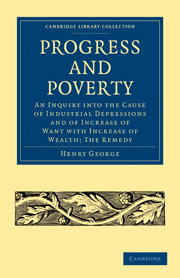 Progress and Poverty
Progress and Poverty Published online by Cambridge University Press: 07 September 2011
We have by inference already obtained the law of wages. But to verify the deduction and to strip the subject of all ambiguities, let us seek the law from an independent starting point.
There is, of course, no such thing as a common rate of wages, in the sense that there is at any given time and place a common rate of interest. Wages, which include all returns received from labor, not only vary with the differing powers of individuals, but, as the organization of society becomes elaborate, vary largely as between occupations. Nevertheless, there is a certain general relation between all wages, so that we express a clear and well understood idea when we say that wages are higher or lower in one time or place than in another. In their degrees, wages rise and fall in obedience to a common law. What is this law?
The fundamental principle of human action—the law that is to political economy what the law of gravitation is to physics—is that men seek to gratify their desires with the least exertion. Evidently, this principle must bring to an equality, through the competition it induces, the reward gained by equal exertions under similar circumstances. When men work for themselves, this equalization will be largely affected by the equation of prices; and between those who work for themselves and those who work for others, the same tendency to equalization will operate.
To save this book to your Kindle, first ensure no-reply@cambridge.org is added to your Approved Personal Document E-mail List under your Personal Document Settings on the Manage Your Content and Devices page of your Amazon account. Then enter the ‘name’ part of your Kindle email address below. Find out more about saving to your Kindle.
Note you can select to save to either the @free.kindle.com or @kindle.com variations. ‘@free.kindle.com’ emails are free but can only be saved to your device when it is connected to wi-fi. ‘@kindle.com’ emails can be delivered even when you are not connected to wi-fi, but note that service fees apply.
Find out more about the Kindle Personal Document Service.
To save content items to your account, please confirm that you agree to abide by our usage policies. If this is the first time you use this feature, you will be asked to authorise Cambridge Core to connect with your account. Find out more about saving content to Dropbox.
To save content items to your account, please confirm that you agree to abide by our usage policies. If this is the first time you use this feature, you will be asked to authorise Cambridge Core to connect with your account. Find out more about saving content to Google Drive.